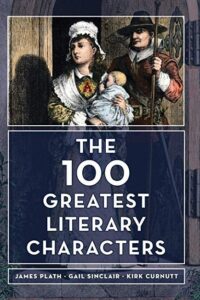The characters aren’t ranked, but John Updike’s most famous fictional creation, Harry “Rabbit” Angstrom, made the cut to be included in The 100 Greatest Literary Characters, published July 2019 by Rowman & Littlefield.
 The authors of the volume—James Plath, Gail Sinclair, and Kirk Curnutt—considered previous lists, plus recommendations from 100 writers, librarians, teachers, and book lovers they polled in order to come up with a list of “characters who have become larger than their lives on the page”—those that are “time-honored reader favorites, prototypes, and cultural influencers . . . who have somehow entered the collective public consciousness, ones who were influential models for others to follow, and ones who have been so popular with readers that they have become significant, memorable, or even cherished.”
The authors of the volume—James Plath, Gail Sinclair, and Kirk Curnutt—considered previous lists, plus recommendations from 100 writers, librarians, teachers, and book lovers they polled in order to come up with a list of “characters who have become larger than their lives on the page”—those that are “time-honored reader favorites, prototypes, and cultural influencers . . . who have somehow entered the collective public consciousness, ones who were influential models for others to follow, and ones who have been so popular with readers that they have become significant, memorable, or even cherished.”
Of Rabbit, Plath writes, “Literature is full of heroes and antiheroes, but Harry ‘Rabbit’ Angstrom is uniquely average—a flawed, irrepressible, and often unlikable human being who is still somehow so endearing to audiences worldwide that one novel couldn’t contain him.” He’s “unfaithful, impulse driven, prejudiced, and old-fashioned when it comes to women. But he is a seeker, a quester of truth. With a healthy libido and appetite for life, Rabbit, though in many ways a typical American male, nonetheless manages to see everyday objects and people in a more brilliant and illuminating light than the average person. He has never lost his childlike sense of wonder—a rare quality that draws people toward him.”
The author with the most characters in the book is Charles Dickens, whose Miss Havisham, Ebenezer Scrooge, and Oliver Twist were included. Among Updike’s contemporaries, Toni Morrison had two (Pilate Dead and Sethe), while Philip Roth and Saul Bellow had one each (Alexander Portnoy and Eugene Henderson, respectively).
The book is available from Amazon.
